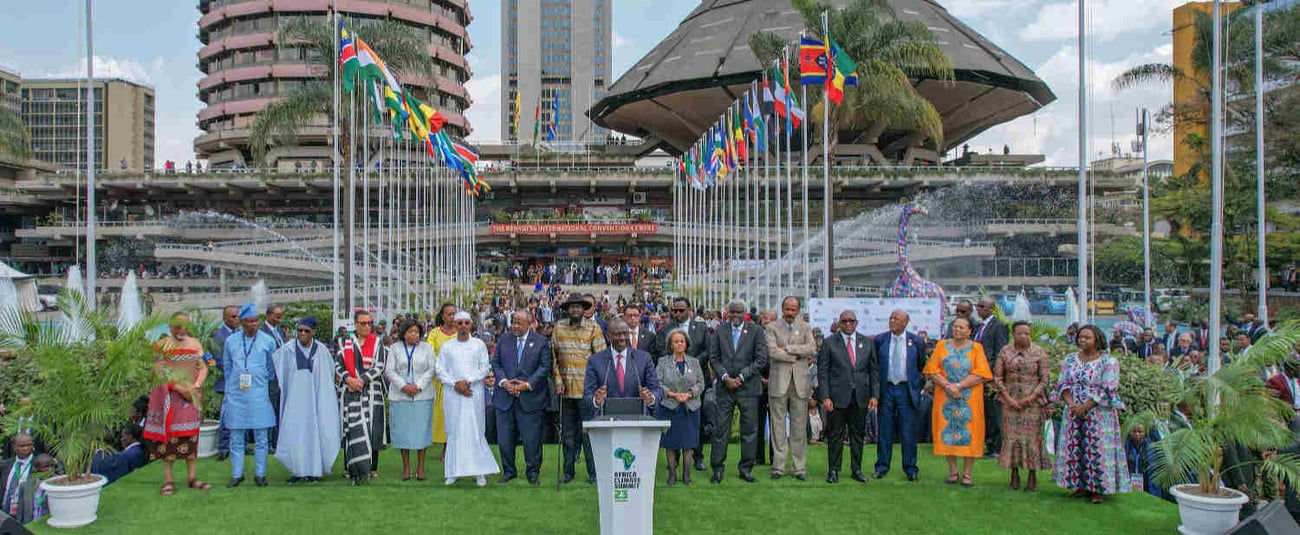|
Getting your Trinity Audio player ready…
|
Writes Baboloki Semele
Nairobi, Kenya: After three days of extensive deliberations around the devastating impacts of Climate Change across the continent and globally, African political and business leaders in Kenya have adopted the Nairobi Declaration to raise US$23 billion for green growth, mitigation and adaptation to address climate challenges in Africa.
The declaration was announced by Kenya’s president, William Ruto, and adopted by African Heads of State and Government in the presence of global leaders and high-level representatives at the closing plenary of the summit on Wednesday in Kenya. African leaders further called on the global community to act with urgency in reducing emissions, honour a commitment to provide $100 billion in annual climate finance to developing countries, and swiftly operationalize the Loss and Damage facility agreed upon at last year’s COP27 in Sharm El Sheikh, Egypt.
On their part, African leaders committed to developing and implementing policies, regulations, and incentives aimed at attracting local, regional, and global investment in green growth and inclusive economies.
The Nairobi Declaration target was announced among several other commitments from world leaders to appreciate that decarbonising the global economy is also an opportunity to contribute to equality and shared prosperity.
The Nairobi Declaration on Climate Change and Call to Action, undertook, among other aims, to further accelerate the operationalisation of the Africa Continental Free Trade Area (AfCFTA).
It also agrees to advance green industrialisation across the continent by prioritizing energy-intense industries to trigger a virtuous cycle of renewable energy deployment and economic activity, with a special emphasis on adding value to Africa’s natural endowments.
There was also a commitment to redouble efforts to boost agricultural yields through sustainable agricultural practices, to enhance food security while minimizing negative environmental impacts.
This, the Declaration states, will require mobilizing more capital for both development and climate action, particularly adaptation. The leaders also called for the overhaul of the current global financial infrastructure, which they said does not meet the needs of developing countries.
In closing remarks, President William Ruto of Kenya stressed the continent’s rich endowments saying that Africa’s potential is made up of incomparably young, resilient, and motivated human capital, natural resource wealth, and green energy potential.
These qualities, he said, would define the future of global opportunity for unprecedented prosperity and a new paradigm of industrialisation that respects the environment and supports our planet’s capacity to sustain biodiversity.
The Nairobi declaration takes into consideration young Africans’ demand for a larger role in decision-making on climate action, as captured in a Youth Declaration produced just ahead of the Africa Climate Summit, and presented to President Ruto. The Youth Declaration also pushes for the accelerated establishment of a Global Green Bank and a New Global Financial Pact that will prioritise young people and their interests in climate financing.
The Africa Climate Summit yielded important commitments in addition to the declaration. Dr. Sultan Al Jaber, the President-designate of COP28, announced a $4.5 billion initiative involving several UAE-based entities and Africa50 to develop 15 Gigawatts of clean power in Africa by 2030. The funding is projected to catalyse at least $12.5 billion in additional financing from multilateral public and private sources. Special Envoy Kerry announced a new Biden administration commitment of $3 billion annually to support adaptation as part of the US PREPARE initiative.
The African Development Bank Group’s President Dr Akinwumi Adesina announced a $1 billion facility to accelerate climate financing for Africa’s youth businesses. In remarks to the assembled leaders, Dr. Adesina stressed that Africa must develop its own carbon markets, properly price its carbon, and turn its vast carbon sink into new sources of enormous wealth, emphasizing that Africa cannot be nature-rich and cash-poor.
He also said Africa needed to revalue its wealth by accounting for the proper value of its abundant natural resources, including its vast forests that sequester carbon. Reacting to the Nairobi Declaration announced by Mr Ruto, James Mwangi, CEO of Equity Bank, on behalf of the private sector, said business leaders are committed to driving investment opportunities across various sectors of the declaration.
On decarbonisation, Mr. Mwangi said the private sector is committed to actively seeking opportunities for nature-based solutions in decarbonisation plans and commitments to net zero, Carbon market, and just transition.
On green transition minerals, he said leaders are committed to investing in new green mineral projects and their value chains by providing fair working conditions. The ACS was dominated by discussions of how to mobilize financing to adapt to increasingly extreme weather, conserve natural resources, and develop renewable energy. African countries will take the proposals in the Nairobi Declaration to a U.N. climate conference later this month and the COP28 summit which begins in the United Arab Emirates in late November.
Joab Bwire Okanda, a senior advisor at the Christian Aid charity, said the call for a global carbon tax was welcome but that to make polluters really pay, false solutions like carbon credits that allow polluters a free ride without taking meaningful action need to be consigned to the dustbin.
Some activists say the credits, which allow polluters to offset emissions by funding green activities, are a pretext for big polluters to keep emitting carbon dioxide. Some analysts like Nazanine Moshiri, a senior analyst at the International Crisis Group think-tank said the summit had not focused enough on how to help Africans adapt to extreme weather. Nazanine added that many communities bearing the brunt of increasing floods and droughts, while also at risk of conflict, are disappointed that there wasn’t more emphasis on ensuring that green investments trickle down to them.
